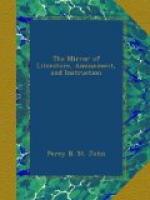Nor direful rage, nor bois’trous
tumult loud,
Nor looks infuriate of the threat’ning
crowd—
Nor haughty tyrants, with their angry
scowl,
Like beasts that o’er the traveller’s
pathway prowl—
Nor southern storm, that o’er the
ocean raves,
And swells in mountain heights its restless
waves,
Can aught avail, with all their force
combined,
To shake the man with firm, though tranquil,
mind!
Guided by Justice and by Wisdom’s
laws,
Secure he stands to guard his righteous
cause.
What—tho’ in awful haste
the tott’ring world,
By Heaven’s command, be into ruin
hurl’d:
As on a rock unshaken he remains,
Upborne by Him who all the just sustains!
Destruction’s thunders rage from
pole to pole—
Yet he undaunted smiles, and bids them
calmly roll!
TOSCAR.
* * * * *
ST. SEPULCHRE’S BELL.
(For the Mirror.)
Among the list of benefactions in the parish church of St. Sepulchre is the following, relative to the tolling of the church-bell on the eve of the execution of unhappy criminals:
“Robert Doue, Citizen and Merchant Tailor of London, gave to the parish church of St. Sepulchre’s the somme of L50. That after the several Sessions of London, when the prisoners remain in the gaole as condemned men to death, expecting execution on the morrow following, the clarke (that is, the parson) of the church shoold come in the night time, and likewise in the morning, to the window of the prison where they lye, and there ringing certain tolls with a hand-bell appointed for the purpose, he doth afterwards (in most Christian manner) put them in mind of their present condition and ensuing execution, desiring them to be prepared therefore as they ought to be. When they are in the cart, and brought before the wall of the church, there he standeth ready with the same bell, and after certain toles rehearseth an appointed praier, desiring all the people there present to pray for them. The Beadle, also, of Merchant Taylors’ Hall hath an honest stipend allowed to See that this is duly done.”
It has been a very ancient custom, on the night previous to the execution of condemned criminals, for the bellman of the above parish to go under Newgate, and, ringing his bell, repeat the verses beneath (which, by the above extract, it would appear, should be the duty of the clergyman), as a friendly admonition to the wretched prisoners:
“All you that in the condemned hold do lie,
Prepare you, for to-morrow you shall die!
Watch all and pray, the hour is drawing near
That you before the Almighty must appear:
Examine well yourselves, in time repent,
That you may not t’ eternal flames be sent.
And when St. Sepulchre’s bell to-morrow tolls,
The Lord above have mercy on your souls!
Past twelve o’clock!”




